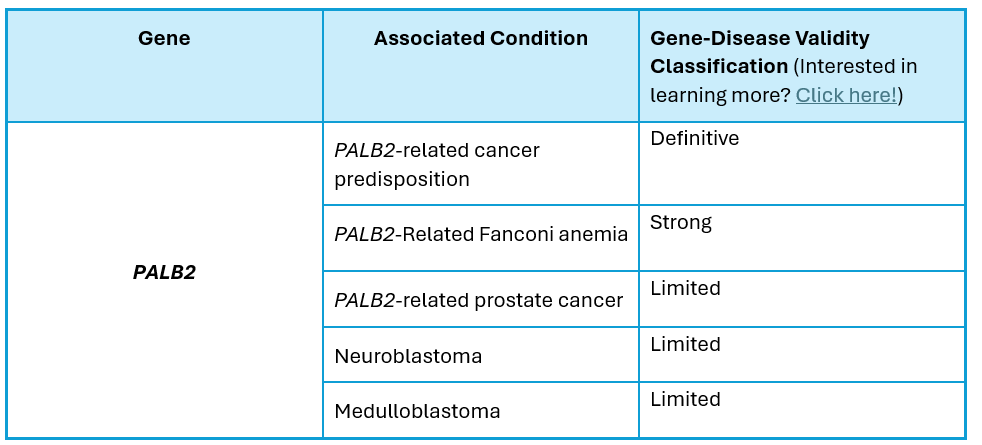
Welcome to the Gene Scene! Each week, we will explore a gene from the ACMG Secondary Findings list—genes identified by the American College of Medical Genetics and Genomics as having clear, actionable health implications.These genes are included because they’re linked to serious but preventable or manageable conditions when identified early. Here, we focus on the condition that led to the gene’s inclusion on the list, providing clear, relevant information that supports your clinic. To subscribe to the Gene Scene, contact your local GSL or send a request to info@ambrygen.com.
To access the Gene Scene archives, visit our blog.
Clinical Phenotype Summary:
The PALB2 gene (NM_024675.3) is located on chromosome 16p12.2, encodes the partner and localizer of BRCA2 protein, and contains 13 coding exons. Pathogenic variants in this gene are known to cause PALB2-related cancer predisposition, which is inherited in an autosomal dominant fashion, and PALB2-related Fanconi anemia (also known as type N), which is inherited in an autosomal recessive fashion.
PALB2-related cancer predisposition is characterized by:
• Increased cumulative lifetime risk for female breast cancer (32-53%)
• Male breast cancer (up to 0.9%)
• Ovarian cancer (3-5%)
• Pancreatic cancer (2-5%)
Penetrance in individuals with pathogenic variants in PALB2 is incomplete and variable expressivity is observed; therefore, cancer risks will differ based on individual and family history.
Fanconi anemia is characterized by the following:
• Progressive bone marrow failure
• Adult-onset aplastic anemia
• Pre- and postnatal growth deficiency
• Abnormal skin pigmentation
• Characteristic skeletal malformations
• Impaired endocrine functioning
Individuals with Fanconi anemia are at an increased risk of malignancies with highest risk of acute myelogenous leukemia, early-onset solid tumors including head and neck squamous cell carcinoma, and non-melanoma skin cancer. Individuals of reproductive age are at 25% risk of having a child with Fanconi anemia with each pregnancy when both biological parents have a pathogenic variant in PALB2.
Loss of function has been reported as the mechanism of disease for PALB2-related tumor predisposition and Fanconi anemia.
Unique Considerations:
• When inherited in an AD manner, PALB2 causes PALB2-related cancer predisposition. When inherited in an AR manner, it causes Fanconi anemia.
Clinical Resources:
Clinician Management Resource for PALB2 and Understanding Your Positive PALB2 Genetic Test Result
Ambry Knows Genes:
• Case-case analysis addressing ascertainment bias for multigene panel testing implicates BRCA1 and PAB2 in endometrial cancer, 2021-Oct.
• Cancer Risks Associated with Germline PALB2 Pathogenic Variants: An International Study of 524 Families, 2020-Feb.
To read more about Ambry’s research on this gene. Visit the "Our Research" dropdown on our website https://www.ambrygen.com/science.
Citations:
• Hu C et al. J Natl Cancer Inst, 2020 Dec;112:1231-1241 PMID:32091585
• Yang X et al. J Clin Oncol, 2020 03;38:674-685 PMID: 31841383
• Breast Cancer Association Consortium JAMA Oncol. 2022 Mar; 8(3): e216744 PMID: 35084436
• Lilyquist J et al. Gynecol Oncol. 2017 Nov;147(2):375-380 PMID: 28888541
• Kurian A et al.JCO Precis Oncol. 2017 Nov;1:1-12 PMID: 35172496
• Song H et al. J Med Genet. 2021 May;58(5):305-313 PMID: 32546565
• García-de-Teresa B et al. Genes (Basel). 2020 Dec 21;11(12):1528, 2020 PMID: 33371494
Ambry Genetics Gene-Disease Validity Scheme
Each week, we explore a gene from the ACMG Secondary Findings list—genes identified by the American College of Medical Genetics and Genomics as having clear, actionable health implications. These genes are included because they’re linked to serious but preventable or manageable conditions when identified early.
To learn more about the ACMG Secondary Findings list, click here.
To read all previous Gene Scene emails, click here.




